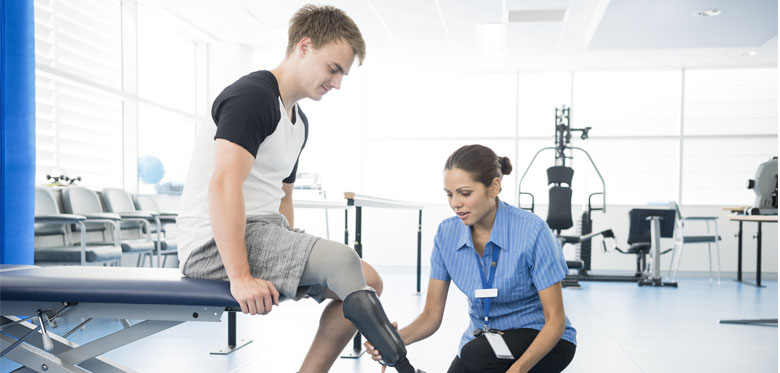Following amputation, there will be a number of professionals involved in the rehabilitation process and you can expect to receive care from the following:
- Doctors – your consultant will have overall responsibility for your care.
- Nurses - the nurses will care for you 24 hours a day, they will tend to your wound and provide you with any required medication.
- Physiotherapists – they will teach you exercises for your arms and legs and will also teach you how to transfer from a bed to a wheelchair. They will devise a treatment programme that is individual to you which will be centred around your own personal goals.
- Prosthetists – these experts make and fit artificial limbs which are known as prostheses. If it is suitable for you to have a prostheses, you will meet a prosthetist following your surgery.
- Occupational therapist – they will help you to return to your everyday life by assisting you with various activities such as personal hygiene, cooking, being able to use a wheelchair. They will carry out a home visit to evaluate wheelchair accessibility and will make recommendations for any required equipment and suggest any home adaptations that they consider necessary.
- Counsellor – amputation can have a profound impact on your mental well-being and counsellors can help by talking through your experience and discussing your emotions.
The day after your surgery, depending on how you are feeling, the rehabilitation process will begin. You will meet with the physiotherapist and will be shown various exercises to keep your joints flexible and your muscles strong. You will learn how to transfer from the bed to a wheelchair and will also be encouraged to touch your stump to prevent it from becoming hypersensitive to normal sensations. It is likely that you will also meet with an occupational therapist so that they can teach you how to use a wheelchair.
As the days progress, you will become stronger and will find that you are able to do more. You will probably start to attend the gym and may discuss an exercise programme with your physiotherapist. You will probably meet other amputees and talking through your feelings with others who have gone through the same process can help with your recovery.
At around one week following surgery, you may be able to begin to use a walking aid (provided your consultant feels this is appropriate). However, to do so, you must have adequate muscle strength and be able to stand for approximately ten minutes. The therapists will support you through this process.
In the days and weeks that follow you may be transferred to a specialist rehabilitation unit to continue your recovery or if your consultant feels that you are able to manage safely at home, you may be discharged. A great deal depends on how your recovery progresses and it is important to note that all patients will recover at different rates.
At Stephensons our amputation claim experts have a great deal of experience in helping those who have undergone amputation, as a result of an injury that wasn't their fault, to recover compensation. This compensation can also help you to access the help and support you may need to enable you to continue to live a happy and fulfilled life. Call our team now on 01616 966 229.



Comments